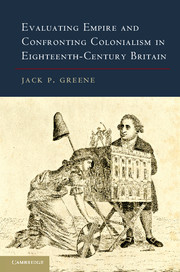Book contents
- Frontmatter
- Contents
- Preface Confronting Empire
- Prologue “Scene of a Foul Transaction”
- 1 “The Principal Cornucopia of Great-Britain's Wealth”
- 2 Outposts of “Loose Vagrant People”
- 3 “A Fabric at Once the Dread and Wonder of the World”
- 4 Arenas of “Asiatic Plunder”
- 5 Sites of Creolean Despotism
- 6 “A Fruitless, Bloody, Wasting War”
- 7 “This Voraginous Gulph of Hibernian Dependence”
- 8 A “Shadow of Our Former Glory”?
- Epilogue “Against Every Principle of Justice, Humanity, and Whatever is Allowed to be Right Among Mankind”
- Index
- References
1 - “The Principal Cornucopia of Great-Britain's Wealth”
The Languages of Commerce, Liberty, Security, and Maritime Supremacy and the Celebration of Empire
Published online by Cambridge University Press: 05 June 2013
- Frontmatter
- Contents
- Preface Confronting Empire
- Prologue “Scene of a Foul Transaction”
- 1 “The Principal Cornucopia of Great-Britain's Wealth”
- 2 Outposts of “Loose Vagrant People”
- 3 “A Fabric at Once the Dread and Wonder of the World”
- 4 Arenas of “Asiatic Plunder”
- 5 Sites of Creolean Despotism
- 6 “A Fruitless, Bloody, Wasting War”
- 7 “This Voraginous Gulph of Hibernian Dependence”
- 8 A “Shadow of Our Former Glory”?
- Epilogue “Against Every Principle of Justice, Humanity, and Whatever is Allowed to be Right Among Mankind”
- Index
- References
Summary
The British Empire, suggested the Barbadian John Ashley, a prolific writer of tracts on the economic aspects of British overseas activities, in 1743, ought to be thought of as “one Body, viz. Great Britain, Ireland, and the Plantations and Fishery in America, besides its Possessions in the East-Indies and Africa.” Ashley's definition of the empire as the home island and its many outlying polities had been standard since the 1720s and 1730s, and increasingly for at least another half-century most metropolitans and colonials using the term were similarly inclusive. Thus Governor Francis Bernard of Massachusetts echoed Ashley when he sought, in a memorandum written for metropolitan authorities in London in the early 1760s, to bring some clarity and precision to the way those authorities thought about the empire. “The kingdom of Great Britain,” Bernard wrote, “has, belonging to and depending upon it, divers external dominions and countries; all which together with Great Britain form the British Empire. Let, therefore,” he recommended, the term “British Empire signify the aggregate body of British dominions, and [the term] the Kingdom of Great Britain the island which is the seat of government.”
Ashley and Bernard were only two of many writers who suggested the utility of thinking about the British world in this expansive way, as a world that included both Britain and its overseas territories. “No Nation in the World,” declared Ashley, was “more commodiously situated for Trade or War than the British Empire, taking all together as one body.” That Ashley, in this passage, mentioned trade ahead of war is significant. Except perhaps briefly in the late 1730s around the outbreak of the War of Jenkins’ Ear, before the Seven Years’ War the association of empire and trade was far more common in the languages of empire than the association of empire and war.
- Type
- Chapter
- Information
- Publisher: Cambridge University PressPrint publication year: 2013

